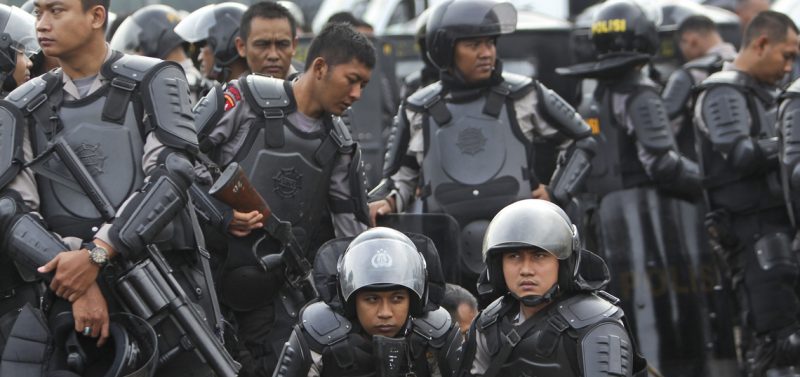Indonesia managed to foil a terrorist attack over the holiday season, but it must step up surveillance, and adopt more sophisticated and comprehensive countermeasures to prevent further incidents from happening.
Following November’s brutal attacks in Paris, claimed by the Islamic State (IS), the world stepped up security to prevent further acts of terrorism. In the last month Brussels went into lockdown, Germany was on high alert after ‘concrete’ threats in Hanover, and a plot was reportedly
foiled in Italy. Here, in the world’s most populous Muslim-majority country, Indonesian authorities claimed to have detected and neutralized a New Year’s Eve terror plot.
In December, officials raided and arrested six members of an allegedly IS-inspired network following coordination with the Australian federal police and the United States’ FBI.
One of the six arrested is reportedly an Islamic boarding school student who was allegedly being “groomed” to carry out a Jakarta attack, to be timed with end-of-year celebrations.
Among the items seized by the police in the raid was a map of Greater Jakarta, bomb-making materials including detonators and chemicals, as well as jihadist manuals. It is also reported that a black flag resembling that of IS was found at the home of one of the arrested suspects.
The December arrests were the latest in a string of terror threats nullified by the Indonesian police. Indeed, national police chief General Badrodin Haiti claims that his forces have foiled as many as nine planned terrorist attacks and arrested 74 terrorism-related criminals in 2015.
The nine supposed plots involved radicals in Solo, Central Java and Tasikmalaya, West Java; as well as the interception of the delivery of weapons to the conflict area of Poso in Central Sulawesi, and the neutralization of a bomb at Mal Alam Sutera in Tangerang.
Reliance on People Surveillance
While the police force’s accomplishments are laudable, it must be noted that in many of the cases, they cannot take all the credit.
As reflected in the latest arrest, in which raids were prompted by Australian, US and Singapore intelligence agencies, Indonesian authorities have often needed the help of external surveillance to detect danger.
According to Bali Monaga, a senior expert for law and cooperation at the National Narcotics Board, Indonesia’s best surveillance work is not carried out by its law enforcement, but by its people.
Mr. Monaga, who has experience of hunting down drug offenders, says that “informal” or “people surveillance” is one of Indonesia’s strengths. According to him, the arrest of the Bali bombers was a perfect example of the role of people surveillance in apprehending perpetrators.
“What is good about Indonesia is the people surveillance. People everywhere will report whatever they see that is suspicious. In Indonesia we are good at it. This is one of our strengths,” he said in a recent discussion with foreign journalists in Jakarta.
He added that given the sheer size of Indonesia and its population, it is difficult for law enforcers to rely on their own limited surveillance capacity.
Social media battle
A few weeks after the Paris attack, a group of online hackers by the name of Anonymous claim they foiled an IS attack on Italy.
The group, who conduct various cyber attacks, launched Operation Paris, or #OpParis, days after the Paris attack, urging its members to hack into IS websites to steal valuable information and leak it online.
On December 25, the group announced in their Operation Paris Twitter account that they have foiled an attack, presumably planned and discussed online, that was set to be carried out in Italy.
“In this month we are working in silence. We have already foiled 1 attack #ISIS against #Italy, we hope to block others. #OpParis #Anonymous,” reads the tweet by Anonymous on its @OpParisOfficial twitter account.
The group, which had previously launched a massive cyber attack on Turkey for allegedly supporting IS, has also posted a YouTube video warning the terror group to “expect us” because its members are going to “hunt you down”.
Though unconventional, such counter-terrorism strategies making smart use of technological expertise could prove to be surprisingly effective, given Islamic State’s social media usage.
IS members are known to take advantage of the anonymity the Internet offers to make their presence known. They also often use social media to communicate and even give instructions to its supporters and sympathizers all over the world.
FBI director James Comey said that IS has “revolutionized” terrorism by seeking to inspire small-scale individual attacks around the world through social media, encrypted communications and slickly-produced propaganda. “Twitter works as a way to sell books, as a way to promote movies, and it works as a way to crowdsource terrorism – to sell murder,” he said, as quoted by The Independent.
However, Comey added that he was confident that security services and technology companies could overcome encryption concealing communication between extremists.
Spread of IS influence
Since declaring its caliphate in June 2014, CNN reports that there have been at least 50 terrorist attacks in 18 countries that have killed 1,100 people and injured more than 1,700 others. It is difficult to determine which of the attacks were directly linked to IS, but with their propaganda and technological know-how, the idea of a possible IS influence on the perpetrators is not impossible.
The majority of the fifty attacks since 2014 were reportedly in the Middle Eastern region, with more than 30 incidences recorded there. Europe and Asia both witnessed seven terrorist attacks, while North America suffered five.
The figures show that although IS has always focused its battles in the Middle East, other parts of the world are by no means safe from IS or IS-inspired threats.
With its Muslim majority, Indonesia may not be considered an ‘infidel’ country, or even a direct enemy of the Islamic State. However, experts have pointed out that IS may view Indonesia’s government as ‘taghut’ or rebellious for not following an Islamic system, and therefore it is possible Indonesia could be seen as a country that could be justifiably attacked.
Waging an ideological war
While foiling attacks is vital in the fight against terrorism, for countries with a large Muslim population like Indonesia, it is arguably just as important that authorities work to find ways to counter radical ideology.
Despite being generally regarded as a moderate Muslim nation, Indonesia is considered fertile ground for the spread of radical ideology. The country has a history of terror strikes by radical Muslims dating back to the 1980s. The 2002 Bali bombing was the deadliest single attack, with 202 people losing their lives.
Taufik Andrie from the Institute for International Peacebuilding, an Indonesian counter-terrorism think tank, says that the “ideological war” will be particularly significant to protect the young generation who are vulnerable to extremist ideas.
“Ideologically, the government must launch some kind of counter-narrative to fight against the ideas and influence of IS in a serious and consistent way, to prevent these ideas and influences from expanding,” Andrie told Indonesia Expat.
These “counter-narrative” measures, he added, should be done comprehensively not only in religious environments, but in the country’s political, economic, social and cultural realms, too, in order to secure success against terrorism in Indonesia.




